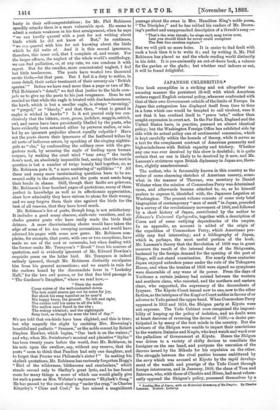BOOKS.
THE POETS' BIRDS.* TiLvr a book on the rich and unhackneyed theme of the treat- ment of birds by the poets should be very interesting, and, in its way, instructive also, is not to be wondered at; but this delightful volume has not only interest and instructiveness, but entertainment as well. Mr. Phil Robinson is, in the fullest sense of the word, a pleasant writer ; be is a genuine humourist, and his humour is of the essentially English kind, reminding us of such choice spirits as Addison and Lamb rather than
of the crowd of Transatlantic farceurs whose final cause seems to be the production of laughter. He has not, like
them, any set humorous intent—has, indeed, no intent at all, save to interest his readers in things which have interested himself—but the fountain is within, and bubbles up because it cannot help itself, the stream wandering through his pages, like Wordsworth's river, at its " own sweet will." Then, too, Mr. Phil Robinson's books gain an additional charm from their tincture of old-fashioned scholarship,—the scholarship of the prescientific time, when protoplasm was unknown, but when speakers and writers quoted Horace as naturally as now-a- days they quote Tennyson, and when they wanted an illustra- tion found one more readily iu an ancient myth than in a modern instance. And yet, in spite of these caviare qualities, which are, it must be admitted, of a nature to repel " the general," Mr. Robinson's books may be heartily recommended even to that frivolous person the circulating-library reader ; for they have the rich humanity which transforms the unknown writer into the known friend, the touch of nature that makes the whole world kin.
In many of his pages Mr. Phil Robinson holds a brief for his friends the birds, in an action against his other friends the poets, and though the suit is strictly amicable, the advocate feels free to indulge in much good-natured hard-hitting. He contends that the singers of the air have suffered many and grievous things at the hands of the singers of the earth ; and though he loves the latter, neither his cause nor his conscience will suffer him to spare their manifold negligences and ignorances. Under one of these heads all the offences of the poets may be classed, and on both counts Mr. Phil Robinson makes out a terribly strong case against the helpless defendants. His first contention is that the birds, as an entire class, have been most unduly and unjustifiably neglected. While more than three thousand different birds are known to science, the author's researches
enable him to declare that,— "Poetry takes ken of a bare hundred, and of oven these a third are so casually mentioned that, virtually, they are useless to the text, and, so far as they contribute any special significance, force, or beauty, almost any other birds might have taken their places. The treasures of the tropics are absolutely ignored, and, in fact, Asia, Africa, and America might not exist, for all the advantage their bird- wealth has been to British poets ; while Europe, except where its species are British species also, is similarly neglected. Taking foreign birds, we find only six—the ostrich, bird of paradise, pelican, flamingo, ibis, and vulture—and even these are only utilised to perpetuate half a dozen of those pseudodoxia ' which Sir Thomas Browne tried to demolish two centuries ago. The ostrich is still, with the poets, ' the silliest of the feathered kind, and formed of God without a parent's mind' ; the bird of paradise, not having recovered its legs yet, sleeps on the wing, and hatches its eggs in mid-air ; the ibis still brandishes its spiral neck at snakes' ; the pelican goes on 'opening to her young her tender breast' ; and the vulture continues to spring from the cliff upon the passing dove.' "
The latter-named offences, particularly the libels upon the ostrich and the vulture, seem to be amply proved, and are certainly highly reprehensible, but we think that to the first portion of the indictment a fairly adequate answer might be made by the poets. Birds naturally appear most frequently in poetry which deals with landscape, and poets of nature, like Thomson, Wordsworth, and Tennyson, who take their stand on English ground can hardly be expected to people our northern woods with the brilliant-plumaged birds of the tropics, upon which Mr. Phil Robinson in a succeeding paragraph expatiates so appreciatively. It must also be remembered that the images of poetry must be drawn from objects with which readers of poetry have some sort of acquaintance, and what, to most of us, is the " magnificent hornbill," the "astonishing trogan," or the " glittering lory," but a name, and nothing more ?
If, however, the poets at this stage scornfully cry, " Let the galled jade wince, our withers are unwrung," they are too
• The Poets' Birds. By Phil Robinson. London : Ohatto and Winans.
hasty in their self-congratulations; for Mr. Phil Robinson speedily attacks them in a more vulnerable spot. He seems to admit a certain weakness in his first arraignment, when he says "we can hardly quarrel with a poet for not writing about birds which he did not know of. But," he continues, " we can quarrel with him for not knowing about the birds which he did write of. And it is this second ignorance, therefore, this inner coil, that I complain of, and resent. For the larger offence, the neglect of the whole world's ornithology, we can find palliation, or, at any rate, we can condone it with regret. But for the smaller, more concentrated neglect, I feel but little tenderness. The poets have wasted two thousand exotic birds,—let that pass. Bnt I feel it a duty to notice, in some detail, their unfair treatment of their seventy-six British species.' " Before we have read more than a page or two of Mr.
Phil Robinson's " detail," we feel that justice to the birds com- pels us to give up the poets to his just vengeance. Does he not remind us that while the eagle is treated with due handsomeness, the hawk, which is but a smaller eagle, is always "ravening," or "gorged," or "bloody," and that thus, "what is grand in eagles is wicked in hawks" P Is it not proved only too con- clusively that the bittern, crow, goose, jackdaw, magpie, ostrich, owl, and raven have been persistently libelled by the poets, who have evidently been actuated either by perverse malice, or mis- led by an ignorant prejudice almost equally culpable ? Have not the poets shown their ignorance of the feathered tribes by all sorts of ludicrous errors, by speaking of the singing nightin- gale as "she," by confounding the solitary crow with the gre- garious rook, by accusing the eagle of feeding upon human corpses, by making the cruel wind "bear away" the turtle dove's nest, an absolutely impossible feat, seeing that the nest in question is but a number of twigs loosely laid together, or, as Mr. Robinson puts it, "a mere scattering of ' spillikins ' " ? All these and many more incriminating questions have to be an- swered sadly in the affirmative, and the poets must needs hang their heads in shame. Still, though their faults are grievous, Mr. Robinson's four hundred pages of quotations, many of them perfect in knowledge as well as in affectionate appreciation, show how admirably they have striven to atone for their wrong, and we may forgive them their sins against the birds for the best of all reasons, that they have loved much.
Mr. Robinson's list of poets, though long, is not satisfactory.
It includes a good many obscure, sixth-rate versifiers, and ex- cludes greater poets who have really made the birds their debtors. A more discriminating choice would have taken the edge off some of his too sweeping accusations, and would have adorned his pages with some new gems. Mr. Robinson com- plains, for example, that poets, with one or two exceptions, have made no use of the coot or corncrake, but when dealing with the former omits Mr. Tennyson's " Brook" from his sources of quotation, and is evidently ignorant of Mr. Edward Dowden's
exquisite poem on the latter bird. Mr. Tennyson is indeed entirely ignored, though Mr. Robinson distinctly exculpates him from his general accusations ; and we search in vain for the curlews heard by the disconsolate lover in " Locksley Hall," for the two owl poems, or for that fine bird passage in "The Gardener's Daughter," where we read how,— "From the woods
Came voices of the well-contented doves.
The lark could scarce get out its notes for joy, But shook his song together as he near'd His happy home, the ground. To left and right, The cuckoo told his name to all the hills; The mellow ouzel fluted in the elm ; The redcap whistled; and the nightingale
Sang loud, as though he were the bird of day."
We are told that sea-birds have been slighted, and this is true; but why magnify the slight by omitting Mrs. Browning's beautiful and pathetic " Seamew," or the noble sonnet by Robert Stephen Hawker, which begins, " Our bark is on the waters ;" and why, when Mr. Swinburne's musical and plaintive" Itylus " has been twenty years before the world, does Mr. Robinson, in his note upon the swallow, say, without any reserve, that the poets " seem to think that Pandion had only one daughter, and to forget that Procne was Philomela's sister P " In making his skylark quotations, Mr. Robinson has curiously forgotten Hogg's " Bird of the wilderness, blithesome and cumberless," which stands second only to Shelley's great lyric, and he has found room for many things a score of which one would gladly give for such a poem as Mrs. Webster's rapturous " Skylark's Song."
He has passed by the ouzel singing "under the crag," in Charles Kingsley's " Clear and Cool ;" he has missed a magnificent passage about the swan in Mrs. Hamilton King's noble poem, "The Disciples;" and he has robbed his readers of Mr. Brown- ing's perfect and unapproached description of a thrush's song :—
"That's the wise thrush; he sings each song twice over, Lest you should think he never could recapture The first fine careless rapture."
But we will pick no more holes. It is easier to find fault with such a book than it is to write it ; and by writing it, Mr. Phil Robinson has placed us and the whole reading world distinctly in his debt. It is pre-eminently an out-of-doors book, a volume for the garden or the glade; but whether read indoors or out, it will be found delightful.







































 Previous page
Previous page